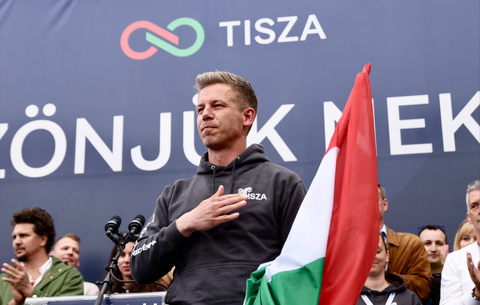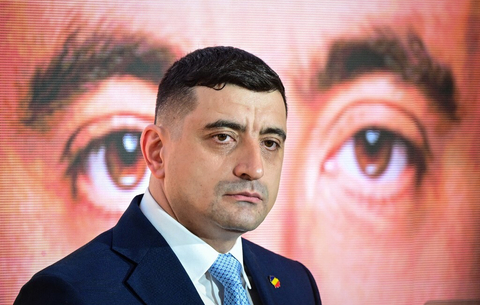Five terms - how many more?
Ibolya Dávid , recently confirmed in her position as leader of the Hungarian Democratic Forum, believes her party could have a government role after the next elections. The question is whether the sympathy felt to a party which manages to be everyone's enemy can be converted into votes.
Ibolya David has now been leader of the Forum for 98 months, her five terms in office making her the longest-serving party leader, outdoing both the Free Democrat Gabor Kuncze and Viktor Orban, leader of Fidesz, both of whom have served with interruptions.
But however stable David's place as party leader, the party she leads is far from secure. Admittedly, things seem to be going well. The party which only just managed to cross the 5 per cent threshold needed to win seats in parliament now enjoys support of 6 to 8 per cent among certain voters according to recent opinion polls. David can also take pleasure in leading the party which is least disliked as a second-choice by voters. But it is not clear how much of this success is due to the party's performance, and how much to the political climate. The Forum is destined to do well in a bitter political environment like today's, with two large camps facing each other down. The forum, which calls for a "normal Hungary" has benefited from positioning itself in the centre. But the slender 1-2 per cent advantage that turned the Forum into the third largest party in the local elections could easily evaporate if either the Socialists or Fidesz made a grab for the currently vacant centre.
The Forum's position is such that it is seen as leftist from the Right and rightist from the Left. So it has credibility problems in the eyes of supporters of both camps. While in moral and ideological terms (family policy, child protection, church policy) the party is closer to Fidesz, in terms of economic policy (privatisation, medical visit fees), it is closer the market-oriented Liberals.
The Forum describes this as pragmatism. Sometimes they will support the opposition, sometimes the government, if they agree with one or the other. But this makes the party look two-faced and unpredictable, which limits its options if ever it wants to ally with parties on either side of the spectrum.
The fact that the Forum has different views in different roles doesn't make things any easier. Since the local elections, the party has been supporting local Socialist-Free Democrat coalitions in various local councils, by supporting the coalitions' choices of candidates for local office. In Budapest, it was Forum votes that let the Socialist Csaba Horvath and the Free Democrat Imre Ikvai-Szabo become deputies to mayor Gabor Demszky, and they also made it possible for coalition-dominated committees to decide who would lead city agencies, rather than the city assembly itself. Nonetheless, when it came to voting on shutting down schools in Budapest, the Forum supported the opposition in opposing the move, though this was only enough to delay proceedings by a few days.
The Forum's parliamentary votes have done nothing to prove Fidesz's accusation the Forum's modern conservatism is heading leftwards. It is true that David's party did not follow Fidesz in boycotting PM Ferenc Gyurcsany's speeches in parliament, but this was only a fig leaf allowing the government to claim the opposition was present. The Forum's MPs were also needed to keep a number of key committee meetings investigating "the danger of extremists planning to topple the constitutional order" from collapsing. But there has been no occasion since the elections when a government proposal has passed in Parliament thanks to Forum votes.
The opposite has happened, however. A change to retirement regulations moved by Fidesz and Christian Democrat MPs passed with the support of the 11-member Forum group in Parliament - though this would not have happened without a few Free Democrat and Socialist MPs voting against the whip. Little can be concluded from the fact that the Forum's attempts at inter-party dialogue are welcomed more warmly by the Left than the Right. When Gyurcsany sat down to talk with David at the beginning of January to discuss the Forum's "13 points to protect the middle class" (abolishing inheritance tax, modifying the pension system and public education), Fidesz was prepared only to send technical experts, and no politicians.
Recently, David's response to this grotesque situation was to say: "If the chairman of Fidesz wants us to, we'll happily play the role of an audience patiently waiting for the star to come on stage." It's hard to imagine reasons other than personal dislike for why Fidesz refuses to support a Forum policy whose slogans - middle glass, family policy - quote from Fidesz's 1998 Manifesto for Civil Hungary, and which both parties supported when they were in coalition from 1998 to 2002. When, at the weekend, David said that after the next elections it would be impossible to form a government without the Forum and its conservative policies, she must surely have been thinking of a Fidesz coalition where Orban was no longer the party's leadre.
JÁNOS DOBSZAY
But however stable David's place as party leader, the party she leads is far from secure. Admittedly, things seem to be going well. The party which only just managed to cross the 5 per cent threshold needed to win seats in parliament now enjoys support of 6 to 8 per cent among certain voters according to recent opinion polls. David can also take pleasure in leading the party which is least disliked as a second-choice by voters. But it is not clear how much of this success is due to the party's performance, and how much to the political climate. The Forum is destined to do well in a bitter political environment like today's, with two large camps facing each other down. The forum, which calls for a "normal Hungary" has benefited from positioning itself in the centre. But the slender 1-2 per cent advantage that turned the Forum into the third largest party in the local elections could easily evaporate if either the Socialists or Fidesz made a grab for the currently vacant centre.
The Forum's position is such that it is seen as leftist from the Right and rightist from the Left. So it has credibility problems in the eyes of supporters of both camps. While in moral and ideological terms (family policy, child protection, church policy) the party is closer to Fidesz, in terms of economic policy (privatisation, medical visit fees), it is closer the market-oriented Liberals.
The Forum describes this as pragmatism. Sometimes they will support the opposition, sometimes the government, if they agree with one or the other. But this makes the party look two-faced and unpredictable, which limits its options if ever it wants to ally with parties on either side of the spectrum.
The fact that the Forum has different views in different roles doesn't make things any easier. Since the local elections, the party has been supporting local Socialist-Free Democrat coalitions in various local councils, by supporting the coalitions' choices of candidates for local office. In Budapest, it was Forum votes that let the Socialist Csaba Horvath and the Free Democrat Imre Ikvai-Szabo become deputies to mayor Gabor Demszky, and they also made it possible for coalition-dominated committees to decide who would lead city agencies, rather than the city assembly itself. Nonetheless, when it came to voting on shutting down schools in Budapest, the Forum supported the opposition in opposing the move, though this was only enough to delay proceedings by a few days.
The Forum's parliamentary votes have done nothing to prove Fidesz's accusation the Forum's modern conservatism is heading leftwards. It is true that David's party did not follow Fidesz in boycotting PM Ferenc Gyurcsany's speeches in parliament, but this was only a fig leaf allowing the government to claim the opposition was present. The Forum's MPs were also needed to keep a number of key committee meetings investigating "the danger of extremists planning to topple the constitutional order" from collapsing. But there has been no occasion since the elections when a government proposal has passed in Parliament thanks to Forum votes.
The opposite has happened, however. A change to retirement regulations moved by Fidesz and Christian Democrat MPs passed with the support of the 11-member Forum group in Parliament - though this would not have happened without a few Free Democrat and Socialist MPs voting against the whip. Little can be concluded from the fact that the Forum's attempts at inter-party dialogue are welcomed more warmly by the Left than the Right. When Gyurcsany sat down to talk with David at the beginning of January to discuss the Forum's "13 points to protect the middle class" (abolishing inheritance tax, modifying the pension system and public education), Fidesz was prepared only to send technical experts, and no politicians.
Recently, David's response to this grotesque situation was to say: "If the chairman of Fidesz wants us to, we'll happily play the role of an audience patiently waiting for the star to come on stage." It's hard to imagine reasons other than personal dislike for why Fidesz refuses to support a Forum policy whose slogans - middle glass, family policy - quote from Fidesz's 1998 Manifesto for Civil Hungary, and which both parties supported when they were in coalition from 1998 to 2002. When, at the weekend, David said that after the next elections it would be impossible to form a government without the Forum and its conservative policies, she must surely have been thinking of a Fidesz coalition where Orban was no longer the party's leadre.
JÁNOS DOBSZAY
English version
hvg.hu
2007. március. 18. 12:59
The Mazsihisz boomerang: boycotting the ceremonies
English version
2007. március. 21. 16:30
In time and space
English version
hvg.hu
2007. március. 05. 10:14
Gyurcsány, head of the Socialist party
English version
hvg.hu
2007. március. 12. 09:50
Responsibility of forces
English version
hvg.hu
2007. március. 05. 10:22
Parallels
English version
hvg.hu
2007. március. 01. 11:54
Goodbye Kadar?
English version
2007. március. 18. 14:02









